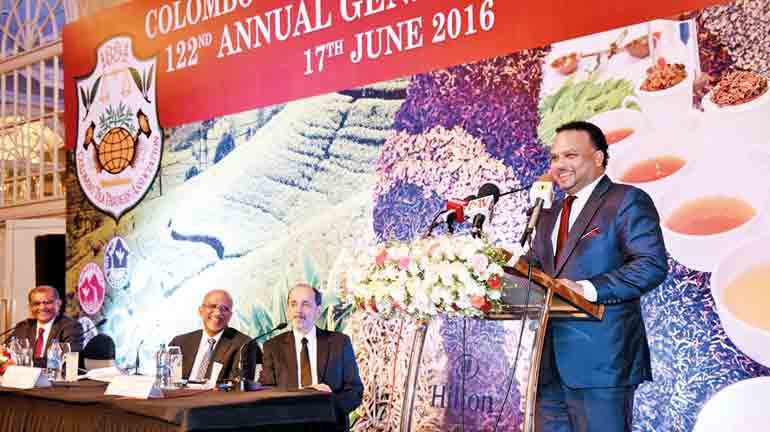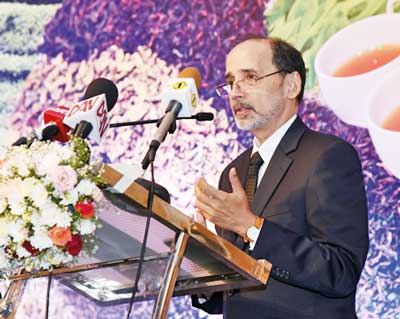Thursday Feb 26, 2026
Thursday Feb 26, 2026
Wednesday, 22 June 2016 00:00 - - {{hitsCtrl.values.hits}}
 Plantation Industries Minister Naveen Dissanayake addresses the 122nd Annual General Meeting of the Ceylon Tea Traders Association while (from left): CTTA Vice Chairman Jayantha Karunaratne, CTTA Chairman Anslem Perera and Sri Lanka Tea Board Chairman Dr. Rohan Pethiyagoda look on – Pic by Samantha Perera
Plantation Industries Minister Naveen Dissanayake addresses the 122nd Annual General Meeting of the Ceylon Tea Traders Association while (from left): CTTA Vice Chairman Jayantha Karunaratne, CTTA Chairman Anslem Perera and Sri Lanka Tea Board Chairman Dr. Rohan Pethiyagoda look on – Pic by Samantha Perera
By Charumini de Silva
Plantation Industries Minister Navin Dissanayake assured that there would be no room for adulteration of tea and he would not hesitate to enforce law for those who try to tarnish the purity and quality of Ceylon Tea.
“As of now, the Tea Board is under immense pressure as we have to implement the Tea Act of 1992. I will assure you that there will be no shortcuts in this. The Tea Commissioner has been told to be very strict with those trying to adulterate tea,” he said addressing the 122nd Colombo Tea Trader’s Association (CTTA) AGM held last week.
The Minister said that there are instances where wrongdoers who approach their friendly Parliamentarians, in turn call him for bailouts.
“I aim to clean up all unsavoury aspects of the tea industry and would enforce the law despite pressure from fellow Parliamentarians. I urge you all not to get involved in wrongdoings because the quality of our tea is constantly coming down and the tea industry wants adulteration of tea to be stopped,” he added.
Dissanayake said as the minister in-charge he intends to maintain a constant close dialogue with stakeholders, maintain quality and purity of Ceylon Tea and find new markets like China, Russia and Iran.
He pledged that the issues related to Iran would be looked on a serious note and also said flood insurance claims will be addressed soon as well.
CTTA Chairman Anslem Perera said an excessive number of tea manufacturing factories have placed undue pressure on supplies of green leaf, which has led to the harvesting of extremely poor quality green leaf, which factories absorb purely to feed their capacities. This, in turn, has resulted in poor quality production, resulting in poor auction prices.
Sri Lanka, with around 715 factories, has an annual production of 320 to 340 million kilograms, whilst Kenya, with only 150 factories, produces in excess of 400 million kilograms of tea.
“Of course, CTC manufacture lends itself to easier and faster processing. Even after taking into account that we are a nation that predominantly adopts orthodox manufacture, with a minute volume of CTCs and Green teas, we still have too many factories, which, due to want of green leaf, gives rise to unethical practices,” he pointed out.
Noting that it has been proven by a few committed plantations that following good manufacturing practices produce teas that are rewarded with attractive prices he stated that if the majority of the manufacturers resort to such practices, many others will follow their example.
“Teas of good quality will invariably fetch equitable prices. However, the problem lies with teas of poor quality. Even with proof of this fact being evident each week at the auction, some producers continue to indulge permanently in bad manufacturing practices and keep complaining about lower prices and the losses they incur, expecting Government subsidies in an unreasonable manner. This emphasises the importance of following good agricultural and manufacturing practices,” he said.
He said under the aegis of ADB funded projects, unproductive lands in RPC plantations were encouraged to grow timber and fuel wood in strict compliance with the laws of the land, as an additional crop to supplement cash flows during low cropping periods.
However, irrational bureaucratic impediments imposed by state officials preclude the harvesting of timber, causing unwarranted hardship to their RPCs. “Factories are, consequently, compelled to purchase fuel wood from unauthorised suppliers who indulge in profiteering through illegal logging operations supported by those who are obviously connected to those in authority. Let us not encourage adulterating our life line product of Ceylon Tea,” he urged the stakeholders.
Sri Lanka Tea Board Chairman Dr. Rohan Pethiyagoda said Sri Lanka needs to bring greater appreciation into the tea industry. Noting that countries like Japan and China have a huge indigenous national appreciation of tea, he pointed that it is something which Sri Lanka sadly lacks.
“This is a great challenge that is before me and the Sri Lankan Tea Board. I have no idea what to do with this, but it is something that we need to address, because there is no wealthy tea producing country that doesn’t have a national appreciation,” he added.
The Chairman expressed that due to the lose connectivity of the tea producing and exporting industries the concept of tea hub has become much controversial.
“I think we are in the middle of revolution. We have two industries producers and exporters which are loosely connected and that is why the tea hub remains unresolved. This is what we need to develop. In a sophisticated market this can no longer be the case. We have to look in the future, estate to direct export,” he explained.
However Dr. Pethiyagoda pointed out that unfortunately 0.7% of Sri Lankan direct estate exports are taking place at present. “This is something we want to do in the next few years, try and build that up to 10%. It seems like a huge challenge, but if we do that it will be a great achievement to the entire industry and for the economy.”
Stating that Sri Lanka’s economy has got to a point where the country can no longer compete on general economic aspects because competitors like India and Kenya have much lower wage and cost competitiveness, he pointed that it was imperative to look into new models.
“India and Kenya are substantially poorer countries than Sri Lanka. Their wage levels are much lower and cost of production is much lower. Sri Lankan tea plucker per kilo gets paid 18 times more, that’s a huge difference. In a situation like that we have to recognise that we can no longer compete at the bottom of the market. We can no longer compete on the price with India and Kenya. We need to look for new models,” he emphasised.